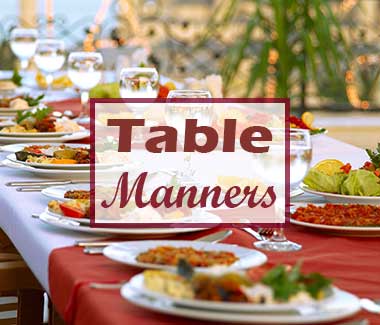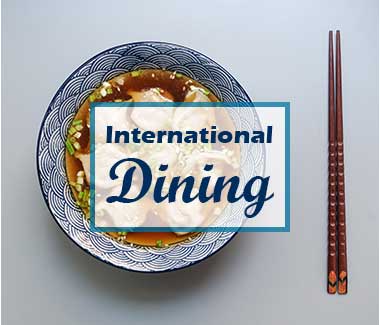Indonesia Dining Etiquette
international dining etiquette
Islam prohibits the use of pork, so you will find it only in Chinese restaurants; most meats of any kind for Muslims need to be prepared halal (the Muslim requirement that the meat be slaughtered as prescribed by certain Islamic codes). Do not eat in front of your Muslim colleagues, or invite them to join you for a meal during the day during Ramadan, as Muslims typically fast (and refrain from drinking and smoking) during the day, and feast with family and friends at night during Ramadan. Ramadan lasts for a lunar month: this is not a good time to do business or go out entertaining in Indonesia.
Dining etiquette for toasts. If you are the honored guest, you will be expected to make a toast, usually soon after the host does or at the end of the meal, just before everyone departs. An appropriate toast is to the health of the host and all those present, and to the prosperity of the business under discussion.
Table Manners
Dining etiquette for utensils. In Indonesia, spoons and forks are used (never knives), or no utensils at all (mainly in more traditional Muslim restaurants). If you need to cut things, use the side of your spoon first, then move on to the fork, if necessary (most foods already come precut). Since the spoon is more important than the fork, if you are right-handed, keep the spoon in your right hand and put it down to switch to the fork if you need it. Dining etiquette for using your hands. Wash your hands before and after you eat. Use your right hand when picking up and eating food, never your left hand, Keep your left hand at your side. Do not place your left hand on the table, and do not pass food with your left hand. When eating "banana-leaf" food, reach into the rice, take some with your fingers, gently roll it between your index and middle fingers and thumb into a self-sticking ball, dip it into the sauce, and mix it with a vegetable or a piece of chicken, then pop the whole thing in your mouth.
Dining etiquette for seating. Men and women may be asked to dine separately. The most honored position is at the middle of the table, with the second most important person seated next. This means that the host will sit at the middle of the table on one side, and the honored guest in the middle on the other side, opposite the host. The honored guest sits on the side of the table farthest from the door. (This is the same at business meetings, with the key people sitting in the middle, flanked on either side in descending order by their aides, with the least important people sitting at the ends of the table farthest from the middle, and closest to the door; the arrangement is mirrored on the other side, because the rules of hierarchy demand that everyone must be able to speak with their opposite peers and those who rank below, but those below cannot speak with those above.)
Dining etiquette for beginning to eat. Do not begin to eat or drink until the oldest man at the table has been served and has begun.
Dining etiquette for restaurants. You may be required to share a table. If so, do not force conversation: act as if you are seated at a private table. Dining etiquette for discussing business. Take your cue from your Indonesian associates: if they bring up business, then it's okay to discuss it.
Dining etiquette in the home. Remove your shoes. Allow the more senior members of your party to enter rooms ahead of you.
Dining etiquette for paying the bill. Usually the one who does the inviting pays the bill.
Dining etiquette for tipping. Tipping is not found in Indonesia.

Our resting utensils etiquette section covers the rules (american and continental) for resting your utensils when taking a break from eating, when you are finished eating, and when you are passing food [...]
Read More





